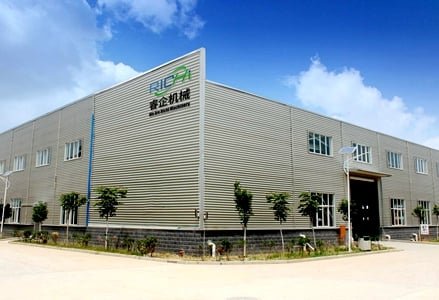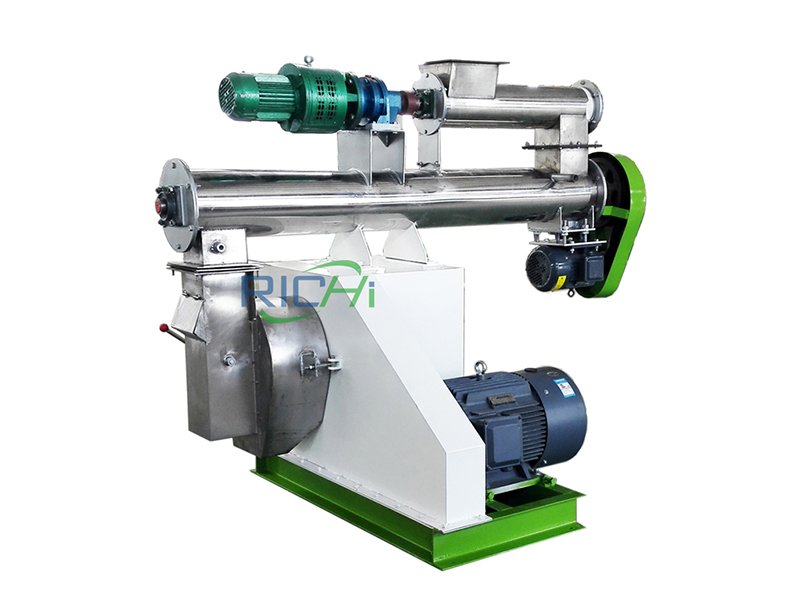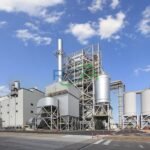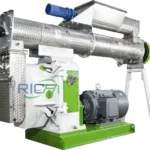Introduction
The animal feed industry plays a critical role in global food production, ensuring that livestock, poultry, and aquaculture receive the necessary nutrients for growth and health. Central to this industry are pellet making machines, which have revolutionized the way animal feed is produced and consumed. This article will delve into the concept of pellet making machines for animal feed, their various use scenarios, and the unique characteristics of RICHI’s pellet making machines. Additionally, we will explore the different models of RICHI SZLH pellet making machines, the customized services offered by RICHI, and the application of RICHI animal feed granules. We will also discuss the other essential equipment found in an animal feed plant, the process of building an animal feed factory, and provide a guide on how to purchase a RICHI animal feed pellet press.
What Is a Pellet Making Machine for Animal Feed?
A pellet making machine for animal feed is a specialized device used to produce feed pellets from various raw materials such as grains, soybean meal, and other nutrient-rich ingredients. The machine works by compressing these materials under high pressure and temperature, forming cylindrical pellets that are uniform in size and composition. This process not only improves the digestibility of the feed but also ensures that the animals receive a balanced diet, leading to better growth rates and overall health.
The machine typically consists of a feed hopper, a pelletizing chamber with a rotating die, rollers, and a cutting knife. The raw materials are fed into the hopper, where they are conditioned with steam to soften them. They are then pressed through the die by the rollers, and the emerging pellets are cut to the desired length by the cutting knife. The pellets are then cooled to harden them before being packaged for distribution.
Pelletized feed has become increasingly popular due to its numerous benefits, including reduced waste, improved feed conversion rates, and enhanced storage stability. For producers, pellet making machines offer a cost-effective solution for large-scale feed production, ensuring consistent quality and output.
Use Scenario of Pellet Making Machine for Animal Feed
Pellet making machines for animal feed are versatile and can be used in various scenarios depending on the scale of production and the specific needs of the animals being fed. Some common use scenarios include:
- Large-Scale Commercial Feed Mills: These operations require high-capacity pellet making machines to produce large quantities of feed for sale to farmers and agricultural businesses. The machines are designed to handle continuous operation, ensuring a steady supply of feed to meet market demand.
- Medium-Sized Farms: Farmers with medium-sized operations can benefit from owning a pellet making machine to produce feed on-site. This allows them to tailor the feed formulation to the specific needs of their livestock, poultry, or aquaculture, ensuring optimal growth and health.
- Small-Scale Feed Production: Small farms or feed producers can use smaller, more compact pellet making machines to produce feed for their animals or for local sale. These machines are often more affordable and easier to operate, making them ideal for businesses with limited production needs.
- Specialized Feed Production: Pellet making machines can be used to produce specialized feeds for specific animal species or life stages. For example, machines can be adjusted to produce pellets with different diameters and nutrient compositions to suit the dietary requirements of poultry chicks, lactating sows, or aquaculture species.
In all these scenarios, the use of pelletized feed helps to improve feed efficiency, reduce waste, and ensure that animals receive a balanced and consistent diet, ultimately leading to better farm productivity and profitability.
What Are the Characteristics of RICHI Pellet Making Machine for Animal Feed?
RICHI is a leading manufacturer of pellet making machines for animal feed, known for its high-quality equipment that delivers superior performance and reliability. The key characteristics of RICHI pellet making machines include:
- High Efficiency: RICHI machines are designed to maximize production efficiency, with advanced technology that ensures high throughput and minimal downtime. The machines are capable of producing large quantities of feed pellets quickly, meeting the demands of commercial feed mills and large farms.
- Durability: Built with robust materials and precision engineering, RICHI pellet making machines are highly durable and can withstand the rigors of continuous operation. This durability translates to lower maintenance costs and longer equipment lifespan, providing excellent value for money.
- Advanced Technology: RICHI incorporates cutting-edge technology into its machines, including automated control systems, adjustable roller and die settings, and steam conditioning systems. These features allow for precise control over the pelletizing process, ensuring consistent pellet quality and optimal feed formulation.
- Ease of Operation: Despite their advanced features, RICHI pellet making machines are user-friendly and easy to operate. The machines are designed with the operator in mind, featuring intuitive controls and straightforward maintenance procedures.
- Energy Efficiency: RICHI machines are engineered to minimize energy consumption, reducing operating costs and environmental impact. This focus on energy efficiency makes RICHI machines a cost-effective choice for feed producers.
These characteristics make RICHI pellet making machines an excellent investment for any animal feed producer looking to improve their production capabilities and product quality.
What Are the Models of RICHI SZLH Pellet Making Machine for Animal Feed?
RICHI offers a range of SZLH pellet making machines, each designed to meet specific production needs. Some of the popular models include:
- SZLH250: A compact model ideal for small to medium-sized feed production operations. It features a moderate capacity and is suitable for producing feed for poultry, livestock, and aquaculture.
- SZLH320: This model offers a higher capacity, making it suitable for medium to large-scale feed mills. It is designed for continuous operation and is capable of producing a wide variety of feed types.
- SZLH420: A high-capacity model designed for large commercial feed mills. It features advanced technology and robust construction, making it ideal for high-volume production.
- SZLH508: The largest model in the SZLH series, offering maximum production capacity and efficiency. It is suitable for large-scale industrial feed production and can handle a wide range of raw materials.
Each model in the SZLH series is designed to deliver high performance and reliability, with features tailored to the specific needs of different production scales. When choosing a model, it is important to consider factors such as production capacity, feed type, and budget to ensure the best fit for your operation.
What Are RICHI’s Customized Services?
RICHI understands that every feed production operation is unique, with specific requirements and challenges. To address these needs, RICHI offers a range of customized services designed to provide tailored solutions for their clients. These services include:
- Equipment Customization: RICHI offers customization options for their pellet making machines, allowing clients to choose specific features, capacities, and configurations that meet their production needs. Whether it’s a small-scale operation or a large industrial plant, RICHI can provide the right equipment to match.
- Feed Formulation Assistance: RICHI provides expert advice and support in developing feed formulations that meet the nutritional requirements of different animal species. This service ensures that the feed produced is of the highest quality and provides the necessary nutrients for optimal animal growth and health.
- Process Optimization: RICHI offers process optimization services to help clients maximize the efficiency and productivity of their feed production operations. This includes adjusting machine settings, improving workflow, and implementing best practices for feed production.
- Training and Support: RICHI provides comprehensive training for operators and maintenance personnel, ensuring that clients can operate their equipment effectively and maintain it in optimal condition. RICHI also offers ongoing technical support to address any issues that may arise.
These customized services help clients get the most out of their RICHI equipment, improving production efficiency, product quality, and overall profitability.
Application of RICHI Animal Feed Granules
RICHI animal feed granules have a wide range of applications in the livestock, poultry, and aquaculture industries. The pellets produced by RICHI machines are designed to provide balanced nutrition, improve feed conversion rates, and enhance animal health and productivity. Some of the key applications include:
- Poultry Feed: RICHI pellets are widely used in the poultry industry to feed broilers, layers, and other types of poultry. The pellets are formulated to meet the specific nutritional needs of poultry at different stages of growth, ensuring optimal weight gain and egg production.
- Livestock Feed: RICHI pellets are also used to feed various livestock, including cattle, pigs, and sheep. The pellets provide a concentrated source of nutrients, supporting healthy growth, reproduction, and overall animal welfare.
- Aquaculture Feed: In the aquaculture industry, RICHI pellets are used to feed fish and other aquatic species. The pellets are designed to float or sink, depending on the species, and are formulated to provide the necessary nutrients for healthy growth and high survival rates.
RICHI animal feed granules are recognized for their high quality and consistency, making them a preferred choice for feed producers and farmers around the world.
What Other Equipment Does the Animal Feed Plant Have?
In addition to pellet making machines, an animal feed plant typically includes a range of other equipment that is essential for the production process. This equipment includes:
- Grinders: Used to reduce the size of raw materials, such as grains and soybean meal, before they are mixed and pelletized. Grinders ensure that the raw materials are of the appropriate size for efficient pellet production.
- Mixers: Mixers are used to blend the ground raw materials with other ingredients, such as vitamins and minerals, to create a homogenous feed mixture. Proper mixing is crucial for ensuring that the final pellets contain a balanced nutrient profile.
- Coolers: After the pellets are formed, they need to be cooled to reduce their temperature and moisture content. Coolers are used to harden the pellets, making them more durable and easier to handle.
- Sifters: Sifters are used to remove any fines or small particles from the pellets after cooling. This ensures that the final product is uniform in size and quality.
- Packaging Machines: Once the pellets are produced, they need to be packaged for distribution. Packaging machines are used to fill bags or containers with the pellets, seal them, and label them for sale.
Each piece of equipment plays a critical role in the feed production process, contributing to the overall efficiency and quality of the final product.
How to Build an Animal Feed Factory Project?

Building an animal feed factory is a complex project that requires careful planning and execution. The following steps outline the process:
- Site Selection: Choose a location that is close to raw material sources, has good transportation access, and complies with environmental and zoning regulations. The site should also have enough space to accommodate the plant’s equipment and infrastructure.
- Plant Design and Layout: Design the plant layout to optimize material flow and production efficiency. Consider the placement of equipment, storage areas, and safety measures to ensure smooth operation.
- Equipment Procurement: Purchase the necessary equipment for the plant, including grinders, mixers, pellet making machines, coolers, sifters, and packaging machines. Ensure that the equipment is compatible with your production requirements.
- Construction and Installation: Construct the plant infrastructure, including buildings, utilities, and support structures. Install the equipment and integrate it into the production line.
- Regulatory Compliance: Obtain the necessary permits and approvals from local authorities. Ensure that the plant meets all environmental, safety, and operational regulations.
- Commissioning and Testing: Once the plant is constructed, conduct commissioning and testing to ensure that all equipment functions correctly and the production process is efficient.
- Operational Start-Up: Begin full-scale production and monitor the plant’s performance. Make any necessary adjustments to optimize production and address any issues that arise.
Building an animal feed factory is a significant investment, but with proper planning and execution, it can be a highly profitable venture.
How to Buy RICHI Animal Feed Pellet Press?
Purchasing a RICHI animal feed pellet press is a straightforward process, but it requires careful consideration to ensure that you select the right machine for your needs. Here are the steps to follow:
- Determine Your Production Needs: Consider the scale of your operation and the type of feed you plan to produce. This will help you determine the required production capacity and the appropriate model of pellet press.
- Consult with RICHI Experts: Reach out to RICHI’s team of experts for advice on the best pellet press for your needs. They can provide detailed information on the available models, customization options, and pricing.
- Request a Quote: Once you have selected the appropriate model, request a detailed quote from RICHI. The quote should include the cost of the machine, any customization options, and the estimated delivery time.
- Place Your Order: After reviewing the quote and ensuring it meets your budget and requirements, place your order with RICHI. You may need to make a down payment to secure your order.
- Arrange for Delivery and Installation: Coordinate with RICHI to arrange for the delivery and installation of the pellet press. RICHI offers installation services to ensure that the machine is set up correctly and ready for operation.
- Training and Support: Take advantage of RICHI’s training and support services to ensure that your operators are familiar with the machine and can operate it efficiently.
By following these steps, you can ensure that you purchase the right RICHI pellet press for your animal feed production needs, setting the stage for successful and profitable operations.
Conclusion
Pellet making machines for animal feed are essential tools for modern feed production, offering numerous benefits in terms of efficiency, quality, and cost-effectiveness. RICHI’s range of pellet making machines, including the SZLH series, are designed to meet the diverse needs of feed producers, from small farms to large industrial operations. With their advanced technology, durability, and customizable options, RICHI machines are a wise investment for any feed producer. By understanding the applications, additional equipment, and the process of building a feed factory, you can make informed decisions that will enhance your production capabilities and contribute to the success of your business.


